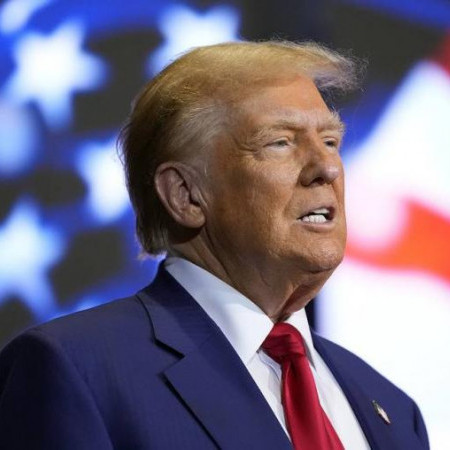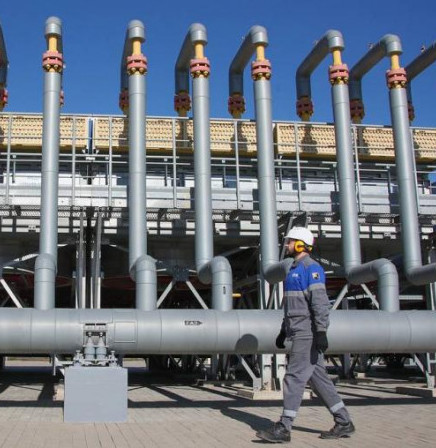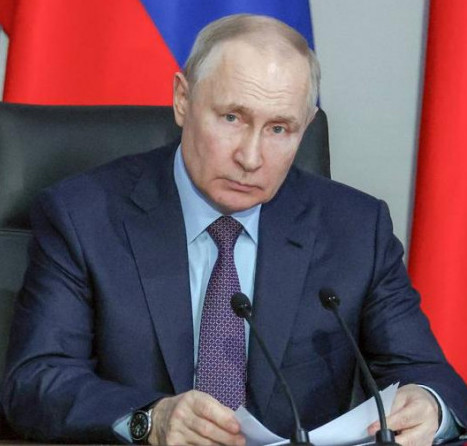European defense industries are scaling up output and remain aligned in backing Kiev militarily; EU energy firms are urging Brussels to boost Russian gas imports; and the Trump administration may demand foreign countries lower trade barriers and purchase American goods in exchange for tariff exemptions. These stories topped Tuesday’s newspaper headlines across Russia, according to TASS news agency.
Izvestia: Could EU become Ukraine’s top arms supplier?
Although Europe is not fully capable of replacing the United States as Ukraine’s chief military donor, Russia must not underestimate the bloc’s capacity to unify, according to experts interviewed by Izvestia. In their view, Europe’s defense industry giants are currently able to produce all types of modern weaponry, excluding fifth-generation fighter jets. Analysts believe the European Union could indeed deliver the 2 mln artillery shells it has promised to Ukraine by 2025. The April 14 meeting of EU foreign ministers further confirmed that member states maintain an extremely hostile stance toward Russia, while Hungary once again reiterated its unwillingness to participate in joint military assistance programs for Ukraine.
"Europe cannot completely replace the United States as Ukraine’s principal military donor. Some countries are already facing deficits of critical defense systems, such as Patriot air defense systems," research fellow at the Center for International Security at the Russian Academy of Sciences’ Institute of World Economy and International Relations Vasily Klimov told the newspaper.
"However, the Baltic states, for instance, will continue to supply Ukraine with as much weaponry as possible, relying on both their own and external resources. The Baltic countries and Sweden are actively buying weapons, gunpowder, and grenade launchers from Finland, and part of this is being sent to Ukraine," the expert added.
The most dangerous miscalculation Russia could make in this situation is to underestimate the enemy’s capabilities, editor-in-chief of National Defense magazine Igor Korotchenko believes. In his view, when analyzing the situation, one must proceed from the most challenging scenarios in order to be prepared and have contingency plans in place.
"Whether or not the EU is capable of becoming Ukraine’s primary military donor is a secondary question. The main one is that, at the political level, EU member states have united and confirmed during numerous meetings and consultations their willingness to provide military-technical and financial backing to the Zelensky regime over the coming years, based on the capacities of the defense industries of EU countries," he told Izvestia.
Vadim Koroshchupov, military expert and junior research fellow at the Institute of World Economy and International Relations, noted that over the past few years, Europe’s leading arms manufacturers have significantly boosted ammunition production. As such, the goal of delivering 2 mln shells is entirely achievable for the EU, he believes.
Izvestia: EU may revisit its pledge to phase out Russian gas as business pressure intensifies
Senior representatives of major European businesses have begun to openly support increasing imports of Russian gas. Executives at the French energy companies TotalEnergies and Engie, in particular, have called for boosting imports from Russia to 70 bln cubic meters per year, up from the current 50 bln. This change in tone comes shortly after the European Commission once again delayed the publication of its roadmap for the complete elimination of Russian energy supplies, Izvestia writes.
Experts believe that any substantial expansion in gas deliveries would reestablishing fundamental ties with Russia, including the dropping of financial claims against Gazprom and the revival of the Nord Stream pipelines. However, if the United States were to gain control over transit gas pipelines, prices for Russian raw materials are unlikely to remain attractive for European consumers.
According to Yekaterina Kosareva, Managing Partner at WMT Consult, it appears that the European Commission has adopted a cautious approach, as countries across the continent digest the shock of former US President Donald Trump’s tariff policies.
"Europe initially endured a severe energy shock following the cutback in Russian energy supplies. And now it is being further strained by Trump’s tariffs, which, among other things, include a demand to purchase $350 bln worth of US energy resources. The European Union has already ‘shot itself in the foot’ once - I doubt its economy can afford further sacrifices. That’s why Brussels has opted for a measured stance, analyzing the situation as it unfolds," the expert noted.
From the Russian side, returning to the gas volumes mentioned by European business leaders would not be technically challenging, according to Alexey Grivach, Deputy Director General of the National Energy Security Fund.
Alexander Frolov, Deputy Director General of the Institute for National Energy, stated that in order to resume gas exports to Europe, it would be necessary to resolve all legal disputes and grant clearance to operate Nord Stream 2.
Valery Andrianov, Associate Professor at the Financial University under the Russian Government, also considers the restoration of Nord Stream the most optimal path forward for all parties involved.
A strong military and the presence of Western allied forces, including those of the United States, on land, at sea, and in the air must become essential security guarantees for Ukraine, Vladimir Zelensky stated. He emphasized that the foremost goal for Ukraine is to preserve its sovereignty and independence, while promising that the territories currently lost will be reclaimed later, Nezavisimaya Gazeta writes.
Zelensky identified two key elements of future security arrangements: rejecting any downsizing of the Ukrainian Armed Forces - which, on the contrary, must be further reinforced and financed - and the deployment of foreign military contingents on Ukrainian territory. These measures, he asserted, must be implemented given the lack of consensus regarding Ukraine’s accession to NATO, which would otherwise serve as the most straightforward and effective means of guaranteeing the country’s security.
According to Zelensky, Ukraine regards the United States as a strategic partner. Therefore, Kiev would like Washington to play a direct role in ensuring Ukraine’s security, particularly by deploying military personnel to defend Ukrainian airspace through aviation and air defense systems.
Political analyst Sergey Mikheyev told Nezavisimaya Gazeta that representatives of Kiev may be testing the current geopolitical environment while slightly modifying their rhetoric. Overall, he noted, the tone has become even more uncompromising, as Kiev continues to advocate for solutions that Moscow has consistently deemed unacceptable.
"It is evident that the Ukrainian authorities currently do not feel any tangible pressure from the United States and believe they need not fear Washington’s response. At the same time, they continue to receive promises of support from Europe. Additionally, while Russia has outlined its own red lines, it has not taken decisive action to enforce them. This also reinforces Ukrainian leadership’s belief that they have little to fear," the analyst explained.
Vedomosti: Trump administration reportedly seeks trade benefits abroad for tariff relief
Countries seeking to avoid US tariffs and secure trade agreements with Washington may be required to purchase American natural gas and beef, lower tariffs on US goods, and reduce the tax burden on companies from Silicon Valley, The Washington Post reported citing sources. The article noted that these are only initial outlines of potential demands from the current administration, which, according to President Donald Trump, is preparing to launch trade negotiations with more than 70 countries. Experts told Vedomosti that the initiative may have political and economic drawbacks.
In addition to reducing tariffs on US goods, the US may also demand that countries eliminate non-tariff barriers - such as standards, inspections, and regulatory requirements. One of the most controversial potential demands from the Trump administration is the termination of shipments of Chinese goods through third countries, a measure that would particularly affect Vietnam and Mexico. This requirement aims to block Chinese manufacturers from bypassing US tariffs.
Countries that strive for greater autonomy or are already integrated into the BRICS+ infrastructure are unlikely to comply with the American terms, according to Alexander Kubyshkin, founder of the investment and consulting firm Enfilade Capital. In his view, for such countries, the issue is not about tariffs but about sovereignty. Meanwhile, US allies such as Japan, South Korea, and Israel are more likely to make accommodations, as they rely on Washington not only economically but also in terms of security. However, Kubyshkin emphasized that even under favorable political circumstances, crafting individual agreements with over 70 countries would be a formidable task. "Negotiations of this scale could take 1.5-3 years," he said.
The problem is not only about tariffs, but also about the current US administration’s tactics in implementing its trade strategy, Head of the Center for Market Strategy at Gazprombank Yegor Susin told Vedomosti. He explained that tariffs suppress demand and dampen economic expectations, but an even more negative factor is the prevailing instability. As for the potential reshoring or relocation of production to the United States, Susin noted that such efforts may not only take considerable time but could ultimately prove economically unsustainable, requiring constant subsidies from the federal budget.
Vedomosti: Russian business associations outline terms for foreign companies’ comeback
The Russian Union of Industrialists and Entrepreneurs (RSPP), which represents the interests of large businesses, has established a working group to develop proposals outlining the conditions for the return of foreign investors in Russia, two sources familiar with the group’s work told Vedomosti. According to these sources, in addition to Russian companies, the group includes foreign business associations such as the American Chamber of Commerce and the Association of European Businesses (AEB). Separate proposals have also been submitted by Delovaya Rossiya, the Chamber of Commerce and Industry, and Opora Russia, which represents the interests of small and medium-sized enterprises.
The key issue under discussion is not so much the criteria for the return of foreign businesses, but rather the legal mechanisms through which they could be enforced, noted a source close to the RSPP working group. In his view, it would be prudent to first establish a framework that includes certain "entry restrictions" for foreign investors.
The return of foreign businesses could be beneficial for boosting competition, but it is also essential to protect Russian companies that have invested capital and already filled the market niches vacated by departing foreign brands, according to President of Opora Russia Alexander Kalinin. In Opora Russia’s view, priority for resuming operations should be given to those companies that preserved their local workforces and have no outstanding debts to contractors.
Currently, investors from so-called unfriendly countries face numerous restrictions on establishing or acquiring Russian legal entities, due to a series of counter-sanctions decrees, Partner at Forward Legal Andrey Filippenko told the newspaper. He noted that the business community’s proposals will likely be framed as special exemptions from the existing restrictions. In any case, Filippenko believes, the initiative would constitute a loosening of the current counter-sanctions regime.
TASS is not responsible for the material quoted in these press reviews



